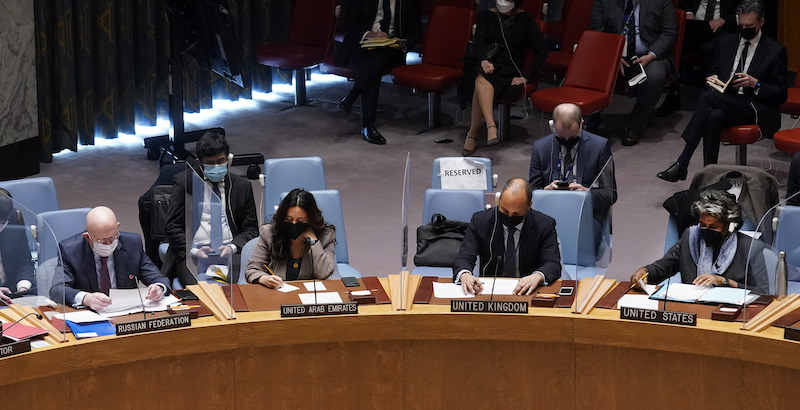Representatives of the United States and Russia at the UN Security Council on Monday They clashed hard On the Ukrainian issue, accusing each other of wanting to stoke tension and showing that a possible diplomatic solution that would allow normalization of relations on the border between Russia and Ukraine remains elusive. Russia has massed more than 100,000 troops on the Ukrainian border, and Western governments fear they are preparing to invade the country.
The Security Council meeting was requested by the United States last week, and the last Russian diplomats tried to prevent it. For the United States, the debate at the United Nations was a way to publicly warn Russia and show everyone American support for Ukraine.
Linda Thomas Greenfield, the US ambassador to the United Nations, accused Russia of being a “threat to peace and security”. “The situation we are facing in Europe is urgent and dangerous, and the stakes for Ukraine and every other member of the United Nations could not be greater.”
The UN Security Council on January 31 (Spencer Platt/Getty Images)
Russian Ambassador Vassily Nebenzia responded very harshly, saying that Russia had every right to move its forces within its territory, that American accusations constituted interference, and that if anything, it was the United States and its allies that were generating “hysteria.” And the tension: “Our Western colleagues talk about the need to de-escalate, but they themselves create tension with their rhetoric and cause an escalation,” he said, looking at Thomas Greenfield. “It’s like you’re wishing and waiting for it to happen, like you wanted to make your speculations come true.”
Then Nebenzia accused Ukraine of inflaming anti-Russian sentiment, adding an undisguised threat: “If our partners push Kiev to sabotage. Minsk agreements [cioè gli accordi per una tregua per fermare gli scontri in Ucraina orientale, mai davvero rispettati nemmeno dalla Russia, ndr]Which is what Ukraine is doing, things could turn out in the worst way ever for Ukraine,” he said, adding that the country “risks destroying itself, and Russia will have nothing to do with that.”
The discussion continued somewhat harshly. When the time came to speak of the Ukrainian ambassador, Nebenzia got up and left the room, saying that he had another engagement.
The moment the Russian ambassador to the United Nations, Vassily Nebenzia, gets up and leaves (AP Photo/Richard Drew)
The meeting of the Security Council ended without any final decision, as expected: Russia, which is a permanent member of the Council, has a veto, which in this case is also supported by China. But the meeting served the United States above all to give a year and formal dimension to the ongoing diplomatic conflict. Chinese Ambassador Zhang Jun sarcastically described the US action as “microphone diplomacy”.
However, diplomatic efforts are continuing to avert a military crisis in Ukraine. Anthony Blinken and Russian Foreign Minister Sergei Lavrov, respectively, will speak by phone on Tuesday. Blinken said on Monday that he had received the Russian response to message He was sent a few days ago in which he affirmed the American will to resolve the issue through diplomatic channels. But he added that it would “not be productive” to discuss the content of the response publicly.
– Read also: How is the Russian army today?
American attempts to support European allies, who are more economically dependent on Russia in the first place, also continue natural gas imports. On Monday, the United States designated Qatar a “key non-NATO ally,” a definition that implies greater trade ties and the sharing of technology and weapons. If Russia cuts off gas supplies to Europe, it is likely that some alternative supplies will come from Qatar, and this alliance statement should give guarantees to both Qatar and Europe.
Meanwhile, several NATO heads of state and government will travel to Ukraine in the coming days to show their support for President Volodymyr Zelensky. British Prime Minister Boris Johnson, In crisis in his ownHe will go to Ukraine on Tuesday. In the coming days, the leaders of the Netherlands, Poland and Turkey will do the same.
– Read also: NATO prepares for war

“Infuriatingly humble analyst. Bacon maven. Proud food specialist. Certified reader. Avid writer. Zombie advocate. Incurable problem solver.”


